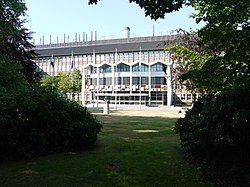| Rijksinstituut voor Volksgezondheid en Milieu | |
 Coat of arms of the Netherlands | |
 | |
 | |
| Agency overview | |
|---|---|
| Jurisdiction | Kingdom of the Netherlands |
| Headquarters | Antonie van Leeuwenhoeklaan 9, Bilthoven 52°07′07″N5°11′21″E / 52.118524°N 5.189059°E |
| Employees | 1700 |
| Minister responsible |
|
| Agency executive |
|
| Parent department | Ministry of Health, Welfare and Sport |
| Website | RIVM website |
The National Institute for Public Health and the Environment (Dutch : Rijksinstituut voor Volksgezondheid en Milieu or simply RIVM) is a Dutch research institute that is an independent agency of the Ministry of Health, Welfare and Sport.
Contents
RIVM performs tasks to promote public health and a safe living environment by conducting research and collecting knowledge worldwide. The results are used to support the Government of the Netherlands in formulating its policy. RIVM's primary tasks are: [1] [2]
- research
- policy support
- national coordination
- intervention programmes
- provision of reliable information to the public and to professionals working in health care about infectious diseases, the environment, nutrition and safety.
RIVM is located in Bilthoven, Utrecht and employs over 1,500 people, many of whom work in multidisciplinary fields.[ citation needed ]
